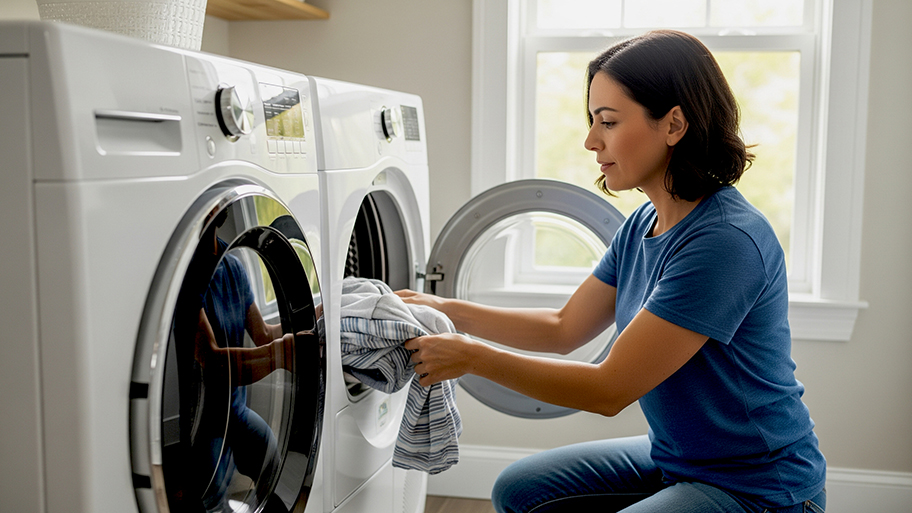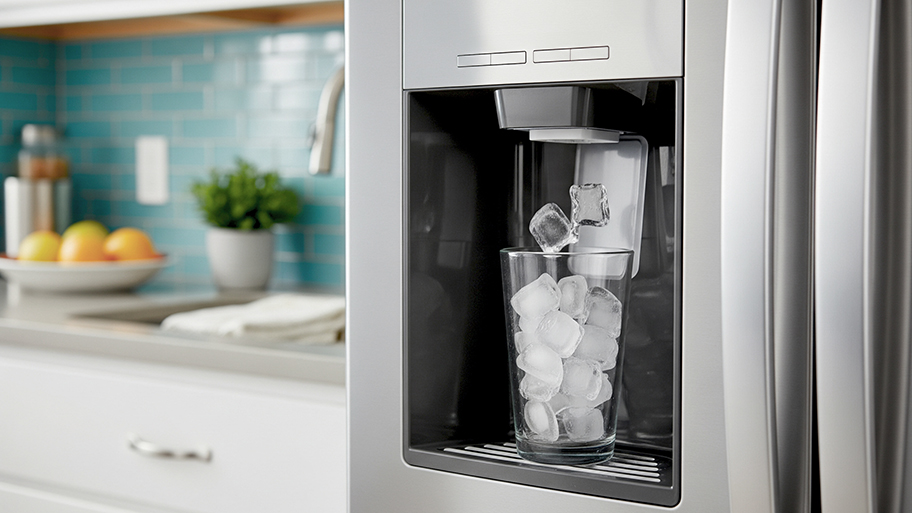
Replacing a dryer belt costs more than just the part unless you can DIY it. The labor cost can easily surpass 90% of the product cost, so if you are handy with tools, try it yourself first.
Don’t be left out to dry—know your stuff before buying a new unit


Gas dryers often cost $50 to $100 more than electric dryers.
Electric dryers are more common and are easier to maintain.
Gas dryers heat up faster, but they require professional installation.
Electric dryers are easier to install and DIY.
Gas and electric dryers both get your clothes dry on laundry day, but how they operate is different. This guide will help you decide if an electric or gas dryer is best for your home.
The primary difference between a gas and an electric dryer is the power source. A gas dryer requires either propane or natural gas and electricity to heat up, turn the drum, and power all the controls. Electric dryers only need electricity to run. To use a gas dryer, you need to have a way to connect the dryer to a gas line.
A gas dryer burns propane or natural gas to heat air, which is then blown into the drum. The drum turns, tossing your clothing about so that the air circulates around and dries it. To use a gas dryer, you need to have a gas line at your home or install a new one.
| Gas Dryer Pros | Gas Dryer Cons |
|---|---|
| Faster | Requires a gas line |
| Less damage to clothing | Needs venting |
| Costs less to run per load | More expensive upfront |
Best for:
Homes with an existing gas line
Homeowners who plan on staying in their current home for more than five years
Gas dryers dry clothes faster because they’re able to generate instant heat to their burners. This is great for busy homeowners who need laundry dried quickly (or get through that clothes tower faster). Plus, your clothes will experience less wear and tear on a gentler cycle because clothes are dried more quickly at specific temperatures.
What makes gas dryers even more appealing is that you pay less per load—especially if it boasts an Energy Star rating. So not only will your clothes dry faster, but you’ll also pay less by using natural gas or propane.
Hiring a professional to install your gas dryer is essential, so you’ll need to factor in this added fee when you’re calculating gas dryer costs. Having a professional take care of the installation will save you from worrying about gas problems and potential leaks in the future.
Gas dryers always have to be vented outside because they produce carbon monoxide. While you may have to vent some electric dryers, most newer models don't require venting.
While gas dryers use a flame and gas to heat up, electric dryers rely on electricity, which heats up coils inside the dryer, allowing it to dry your laundry. Most electric dryers require 240 volts, which is a higher voltage than is found in the standard U.S. home. You'll need a special outlet installed to use an electric dryer.
| Electric Dryer Pros | Electric Dryer Cons |
|---|---|
| Easy to install | Higher energy bill |
| Longer lifespan | Longer drying time |
| Less expensive | Requires higher voltage than a traditional outlet |
Best for:
Homes without an existing gas line or hookup in the laundry room
Laundry areas with an existing 240-V outlet
Homeowners who don't plan on staying in their current home for more than five years
Unlike gas dryers, you don’t have to hire a professional to install your electric dryer. So if you consider yourself to be pretty handy and you like DIY projects, installing an electric dryer right out of the box will be a piece of cake.
The lifespan of an electric dryer is longer than gas dryers, but only slightly. An electric dryer can last for about 14 years, while a gas dryer will work for 13 years.
Electric dryers are more expensive to run and take longer to heat up. And though installation is DIYable, if your electrical dryer isn’t installed properly, you run the risk of being electrocuted or possibly starting a fire. Be careful with the wiring because faulty wires can be hazardous.
Check out how gas dryers and electric dryers compare side by side.
Gas dryers cost more than electric dryers. A typical gas dryer costs more than a typical electric dryer, but when they're both high-end models the prices are relatively the same. You could pay between $1,200 to $1,600 for a top-of-the-line gas or electric dryer.
In most cases, it’s best to call a local appliance installation company to set up your dryer. While it may be easy for a homeowner to install an electric dryer by simply plugging it into an outlet and connecting the hose, gas dryers are more complex.
To install a gas dryer, you’ll need to hire a licensed plumber to hook up the gas. This additional cost can range anywhere from $75 to $125 depending on the complexity. We don’t suggest tackling this part on your own as gas leaks can be lethal.
While the upfront costs of electric and gas dryers are similar, the same is not true for the cost to run the units. Gas dryers run hotter than electric dryers, so it takes less time and energy to dry clothes. That’s why gas dryers are typically less expensive to run than electric dryers.
Determining the cost to run each option will also depend on your home’s power source. For instance, homes with solar panels can generate eco-friendly electric energy to power a dryer without much effect on your utility bills. But if your electricity comes from a power plant, which is the case for most homeowners, then you may want to opt for gas instead.
Your total cost to run plays the largest role in energy efficiency. That as well as the time it takes to heat up, which is usually longer with an electric dryer. Longer heat up time and total drying time will mean that electric dryers are overall less energy efficient.
Gas is also generally priced cheaper than electric when comparing costs from your energy provider.
You’ve got a better chance at handling your own maintenance repairs on an electric model. Simple repairs can be anything from changing the belts or a switch to even setting up a new heater.
However, you’ll need to call in a local gas appliance repair professional to address any gas dryer repairs. It can cost anywhere from $75 to $125 for a simple service call, not including the parts.
No one likes to wait for hours for clothes to cycle through the dryer. Since gas dryers reach higher temperatures than electric dryers, they typically have shorter cycle times. Plus, gas dryers heat up faster than the electric counterparts, making them the clear winner of the efficiency contest.
As mentioned above, the lifespan of an electric dryer is slightly longer than gas dryers. An electric dryer can last for about 14 years, while a gas dryer will work for 13 years. However, the lifespan of a dryer depends on its use, maintenance, and repairs over time.
Not sure which type of dryer you have? No problem. Start by looking behind the unit. An electric dryer will feature a large cord connected to an outlet, without connection to a gas line. On the other hand, a gas dryer plugs into an outlet that’s connected to a gas valve, plus it has an exhaust pipe. If you’re still struggling to make the distinction between a gas and electric dryer, find your model number and search it online for a final answer.
If you’re sold on a particular gas or electric dryer, but your power source is the opposite, you’ll need to work with an electrician or plumber to get the right one installed first. You’ll most likely be interested in converting an electric dryer to gas. Converting a gas dryer to electric isn’t a common practice since it’s considered less energy efficient.
It may come as a surprise, but plumbers are oftentimes the best professionals to hire for gas-related jobs. In fact, most states require plumbers to maintain certifications and insurance in order to take on projects related to gas, including installing and repairing gas lines for appliances, like ovens, stoves, and dryers.
The process for converting to a different power source is about the same, but there are some key differences to keep in mind:
To install a gas dryer without an existing gas hookup, you’ll need to contact a plumber who can run a new gas line in your home. They will coordinate with your local gas company and acquire the correct permits to start the project.
While it's not common to convert a gas dryer to electric, if you want to proceed, you'll need to hire an electrician. They confirm the outlet is a 240 volts or help you upgrade your electrical panel before installing your dryer. You'll also need to call a local plumber to cap your gas line.
Ebonee Williams contributed to this piece.
Great service! Showed up same day and made repairs. Very professional and reasonable prices too!
The local appliance store we normally use could not come for 2 weeks and suggested A+ Charlie's. We scheduled an appointment for the next day. Charlie called about 6 o'clock that evening and ask to stop by and take a look at the refrigerator. By 7:30 that evening our refrigerator was back in...
Five years ago, I purchased a home and had Doug Bates complete an electrical inspection. The sellers paid Doug over $800 in electrical repairs. Fast forward five years….I have now put my house back on the market to sell. The new buyer had Doug Bates complete the electrical inspection again....
I received excellent service at Foundation Auto Repair. They quickly diagnosed my problem and called to let me know what was wrong and how much it would cost. It took 4 days to get parts, conduct the repairs, and test drive the vehicle (I had multiple issues) but they communicated with me...
After water damage, our entire home needed to be redone. We had hired Tony Verhaeg in the past when we first bought this home and did a remodeling job with which we were very satisfied back in 2000. This time almost everything had to be redone from scratch. Tony personally handled or oversaw...
From average costs to expert advice, get all the answers you need to get your job done.

Replacing a dryer belt costs more than just the part unless you can DIY it. The labor cost can easily surpass 90% of the product cost, so if you are handy with tools, try it yourself first.

Discover the average ice maker repair cost, key price factors, and tips to save. Learn how to budget for your ice maker repair and when to repair or replace.

Depending on repair needs and machine age and type, the cost to replace a heating element in a dryer can vary. Learn the average repair costs.

Looking for a new washer or dryer to keep your clothes fresh and clean? Learn how to choose a washer and dryer by knowing what to consider.

Short on kitchen counter space? Learn how to install a microwave over a stove in 10 simple steps in this how-to guide.

Discover the key signs of Freon leak in refrigerator units, what causes them, and when it’s time to call a pro. Don’t ignore these cooling red flags!